
Charmed Life is the fourth studio album by English rock singer Billy Idol, released on 30 April 1990 by Chrysalis Records.
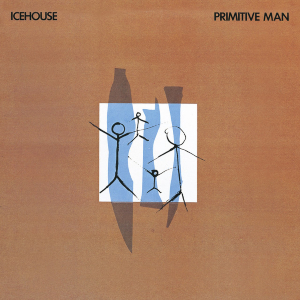
Primitive Man, the second studio album by Australian rock band Icehouse, was released on 20 September 1982. In January 1982, Icehouse founder Iva Davies started recording Primitive Man essentially as a solo project. It was co-produced with Keith Forsey, who later worked with Simple Minds and Billy Idol. Forsey supplied additional percussion; Davies supplied vocals, lead guitar, keyboards, bass guitar and programmed the Linn drum machine. Released as an Icehouse album, Primitive Man reached number 3 on the National album charts and provided their international breakthrough single, "Hey Little Girl", which peaked at number 7 in Australia, number 2 in Switzerland, number 5 in Germany, the top 20 in UK, Sweden and Netherlands, and number 31 on the US Billboard Mainstream Rock chart. Another single "Great Southern Land" made the Australian top 5; it was later featured in the 1988 Yahoo Serious film Young Einstein, and remains their most popular song according to listeners of Triple M in 2007. To promote Primitive Man on tour, Davies re-assembled Icehouse with Michael Hoste (keyboards) and John Lloyd (drums), and new members: Bob Kretschmer, Guy Pratt and Andy Qunta.

Idol Songs: 11 of the Best is a greatest hits album by English rock singer Billy Idol, released on 20 June 1988 by Chrysalis Records. It comprises all the singles released from his first three studio albums—Billy Idol, Rebel Yell and Whiplash Smile—as well as the live version of "Mony Mony" and re-recorded Generation X song "Dancing with Myself", both of which appeared on Idol's debut EP Don't Stop. A limited edition of the album contains two extra remixes, and another limited edition contains four extra remixes. The album reached number two on the UK Albums Chart and has been certified platinum by the British Phonographic Industry (BPI). In 2003, the album was reissued with a different title and cover as The Essential.

Billy Idol is the debut studio album by English rock singer Billy Idol, released on 16 July 1982 by Chrysalis Records. After the breakup of the band Generation X and the release of his first solo extended play, Don't Stop (1981), Idol began working on his debut album. Produced by Keith Forsey, Billy Idol is a rock album with strong influences of new wave music.
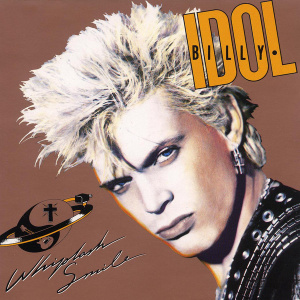
Whiplash Smile is the third studio album by the English rock singer Billy Idol, released on 20 October 1986 by Chrysalis Records. After his successful studio album Rebel Yell (1983), Idol continued his collaboration with producer Keith Forsey and guitarist Steve Stevens while writing and producing songs for the album. The album utilizes Stevens' characteristic guitar work, dance beats, and synth-heavy production.

Vital Idol is a remix album by English rock singer Billy Idol, released in June 1985 by Chrysalis Records. It contains remixed songs from his first two albums and the Don't Stop EP. The album was reissued in the United States with one extra track in September 1987, peaking at number 10 on the Billboard 200. The US release was supported by a non-album live single version of "Mony Mony".
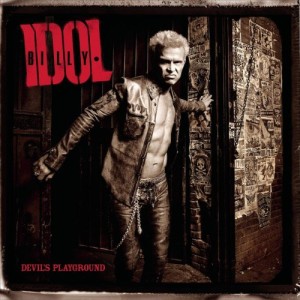
Devil's Playground is the sixth studio album by English rock vocalist Billy Idol, released on 22 March 2005. It is his first studio album in over a decade, and his first new studio songs since 2001. The album also reunited Idol in the studio with guitarist Steve Stevens and producer Keith Forsey. All songs were written or co-written by Idol except "Plastic Jesus". The album was engineered and mixed by Brian Reeves at the Jungle Room in Los Angeles.

Greatest Hits is a compilation of Billy Idol's most popular singles, released by Capitol Records in 2001. The album includes two additional tracks: a live recording of one of his most popular songs, "Rebel Yell", plus a new version of Idol's longtime producer Keith Forsey's "Don't You ". Although Forsey originally wrote the song with Idol in mind, Idol turned it down and eventually the song was given to Simple Minds who would go on to make it a worldwide hit in 1985. Greatest Hits was certified platinum by the RIAA in 2005.

Kiss Me Deadly is the third studio album by the English punk rock and new wave band Gen X. Produced by Keith Forsey it was issued in the United Kingdom on 23 January 1981. It was the final album to be released before their disbandment, though they would briefly reunite in 1993.

"Eyes Without a Face" is a song by English rock musician Billy Idol, from his second album Rebel Yell (1983). It was released in June 1984 as the second single from the album. The song is softer and more ballad-like than most of the album's other singles. It reached No. 4 on the Billboard Hot 100, becoming Idol's first top-10 hit in the US. The recording features the voice of Perri Lister—she appeared in the banned video for "Hot in the City"—who sings "Les yeux sans visage" as a background chorus. The title of the song refers to the English title of French director Georges Franju's 1960 film Les Yeux sans visage.

Mirror Moves is the fourth studio album by English rock band the Psychedelic Furs, released 21 August 1984 by Columbia Records, two years after their previous studio album, Forever Now.

"Rebel Yell" is a song by English-American rock musician Billy Idol. It is the title track of his 1983 album of the same name, and was released as the album's lead single in October 1983. Although it charted outside the UK Top 40, a 1985 re-issue peaked at no. 6, and it reached no. 46 in the US. The song received wide critical acclaim and in 2009 was named the 79th best hard rock song of all time by VH1 based on a public vote.
Keith Forsey is an English pop musician and record producer.

William Michael Albert Broad, known professionally as Billy Idol, is an English-American singer, songwriter, musician and actor. He first achieved fame in the 1970s emerging from the London punk rock scene as the lead singer of the group Generation X. Subsequently, he embarked on a solo career which led to international recognition and made Idol a lead artist during the MTV-driven "Second British Invasion" in the US. The name "Billy Idol" was inspired by a schoolteacher's description of him as "idle".

Thommy Price is an American musician. He has played drums in a number of bands, including Scandal, Billy Idol, Blue Öyster Cult, and Joan Jett and the Blackhearts, and is an in-demand session drummer.

Kings & Queens of the Underground is the eighth studio album by English rock vocalist Billy Idol, released on 17 October 2014 by BFI Records. It was Idol's first album of new original material since Devil's Playground (2005) and only his third album in over twenty years. The album debuted at number 34 on the Billboard 200, becoming Idol's highest-debuting album to date. The album also peaked at number 9 on the Billboard Top Rock Albums chart for the week of 8 November 2014. Videos were released for the songs "Can't Break Me Down" and "Save Me Now".

"Sweet Sixteen" is a song by British singer-songwriter Billy Idol, released in 1987 as the third single from his third studio album Whiplash Smile (1986). The song written by Idol and produced by Keith Forsey. "Sweet Sixteen" peaked at No. 20 in the US and No. 17 in the UK. It was also a hit across Europe and beyond.

"Speed" is a song by British singer-songwriter Billy Idol, originally included in the soundtrack of the eponymous film. It was written by himself and by guitarist Steve Stevens, and released in August 1994 as the film's main song through Arista Records worldwide and Chrysalis Records in the United States.
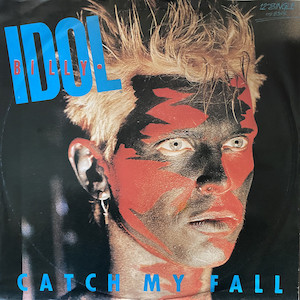
"Catch My Fall" is a song by Billy Idol from his 1983 studio album Rebel Yell. It became the album's fourth and final single. It was written by Idol and produced by Keith Forsey.
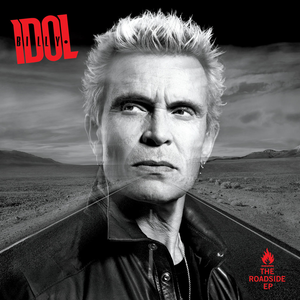
The Roadside is an EP by English singer Billy Idol, his first release on George Harrison's Dark Horse Records. The EP is Idol's first release of new material since 2014's album Kings & Queens of the Underground. It was produced by Butch Walker and released on September 17, 2021. The EP's songs all feature Idol's longtime collaborator, guitarist Steve Stevens.


















